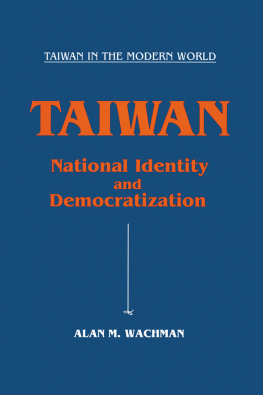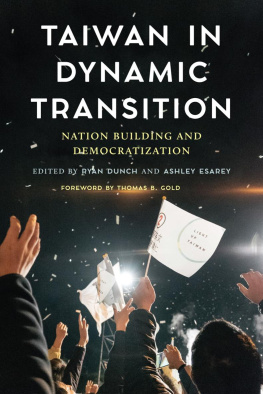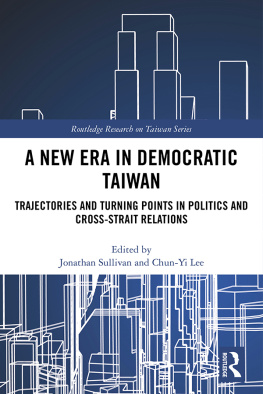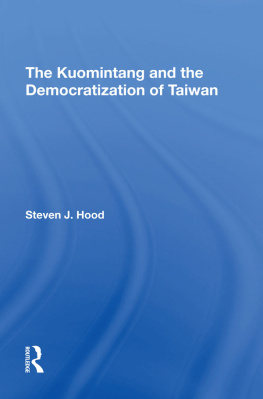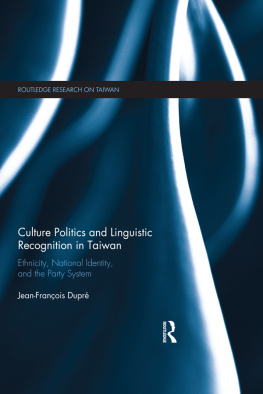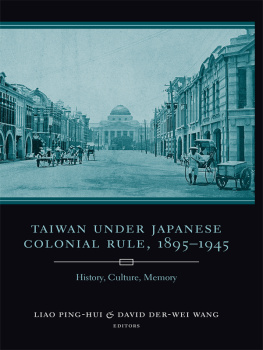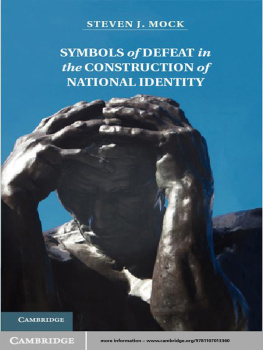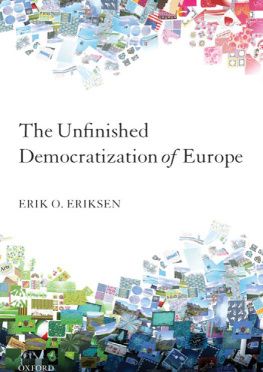TAIWAN
National Identity
and
Democratization
At a moment when clashing forces of nationalism and heightened demands for political reform dominate the political life of many states, the democratization of Taiwan is a drama worthy of study. Since 1987, Taiwan has experienced a sequence of political changes that few thought possible and which standing theories of democratization assert could not happen. At issue is the persistent uncertainty about the national identity of Taiwan. This reflects the stark clash of nationalist visions: the Chinese nationalism manifested by the Mainlander elite in the ruling Nationalist Party (KMT), and the Taiwanese nationalism manifested by those who advocate that Taiwan be an independent state. By any measure, Taiwan has become a democracy despite the inability of the political elite to reach consensus about what is the national identity of the state.
This study examines the history of the democratization in Taiwan from the perspective of the national identity problem. Based on interviews with leading figures in the KMT and opposition parties, it elucidates the nature of the conflict among political elites about identity since the Nationalists came to Taiwan in 1947, describes how the conflict about identity has affected the course of democratization since the onset of reform in 1987, and explains why the political science theories about nationalism and democratization do not account for what has happened in Taiwan. The author has written to reach a broad readership and has not burdened the text with excessive jargon that would limit its accessibility. The historical discussion is interwoven with quotations from contemporary notables as well as commentary about conceptual matters pertaining to the process of democratization. This results in a work that will appeal to both the Taiwan specialist as well as those interested in national identity and the process of democratization per se.
TAIWAN IN THE MODERN WORLD
TAIWAN
National Identity and Democratization
Alan M. Wachman
THE OTHER TAIWAN
1945 to the Present
Edited by Murray A. Rubinstein
THE ROLE OF THE STATE IN TAIWANS DEVELOPMENT
Edited by Joel D. Aberbach, David Dollar, and Kenneth L. Sokoloff
POLLUTION, POLITICS, AND FOREIGN INVESTMENT IN TAIWAN
The Lukang Rebellion
James Reardon-Anderson
TAIWAN ENTERPRISES IN GLOBAL PERSPECTIVE
Edited by N. T. Wang
TAIWAN
Beyond the Economic Miracle
Edited by Denis Fred Simon and Michael Ying-mao Kau
CONSTITUTIONAL REFORM AND THE FUTURE OF THE REPUBLIC OF CHINA
Edited by Harvey J. Feldman
THE PROTESTANT COMMUNITY ON MODERN TAIWAN
Mission, Seminary, and Church
Murray A. Rubinstein
CONTENDING APPROACHES TO THE POLITICAL ECONOMY OF TAIWAN
Edited by Edwin A. Winckler and Susan Greenhalgh
STATE AND SOCIETY IN THE TAIWAN MIRACLE
Thomas B. Gold
First published 1994 by M.E. Sharpe
Published 2015 by Routledge
2 Park Square, Milton Park, Abingdon, Oxon OX14 4RN
711 Third Avenue, New York, NY 10017, USA
Routledge is an imprint of the Taylor & Francis Group, an informa business
Copyright 1994 Taylor & Francis. All rights reserved.
No part of this book may be reprinted or reproduced or utilised in any form or by any electronic, mechanical, or other means, now known or hereafter invented, including photocopying and recording, or in any information storage or retrieval system, without permission in writing from the publishers.
Notices
No responsibility is assumed by the publisher for any injury and/or damage to persons or property as a matter of products liability, negligence or otherwise, or from any use of operation of any methods, products, instructions or ideas contained in the material herein.
Practitioners and researchers must always rely on their own experience and knowledge in evaluating and using any information, methods, compounds, or experiments described herein. In using such information or methods they should be mindful of their own safety and the safety of others, including parties for whom they have a professional responsibility.
Product or corporate names may be trademarks or registered trademarks, and are used only for identification and explanation without intent to infringe.
Library of Congress Cataloging-in-Publication Data
Wachman, Alan.
Taiwan : national identity and democratization / Alan M. Wachman.
p. cm.
(Taiwan in the modern world) An East gate book. Includes index.
ISBN 1-56324-398-9. ISBN 1-56324-399-7 (pbk.)
1. TaiwanPolitics and government1988- 2. DemocracyTaiwan.
I. Title. II. Series.
DS799.847b.W33 1994
305.800951dc20 94-12659
CIP
ISBN 13: 9781563243998 (pbk)
ISBN 13: 9781563243981 (hbk)
Just before the start of the Chinese New Year celebration, I sat in one of Taipeis ubiquitous Pizza Hut outlets trying to read as I ate my lunch. My concentration was disrupted by the frenzy of animated chatter and the festivity of excited laughter. Now and then as I looked up from the page, I noticed that the restaurant was bustling with young families and clusters of youths stylishly coifed and garbed in fashionable dress that any American raised on bargain basement wear would find lavish. The scene prompted me to reflect on all the ways Taiwan has changed since my first stay began in 1980.
At that time, there were no Pizza Huts on Taiwan, nor other Western food franchises for that matter. The prevailing wisdom then was that Chinese did not like cheese. Beyond that, people were not accustomed to spending what one must spend now for a side order of neon glitter with ones meal. At that time, there was nothing chic about the way people dressed. Adults often wore traditional blouses or jackets with high, stiff collars and knotted cloth buttons. Professional men tended to wear Chung Shanstyle leisure suits and women wore frilly frocks with a hefty dose of lace. Students were perpetually seen in monotonous khaki, olive, black, or blue school uniforms. Unfortunate hatchet-job haircuts limited girls tresses to the depth of the earlobe and kept all the boys in military stubble.
Indeed, in the eyes of a newly arrived American teacher, a severe and Spartan militarism pervaded daily life on Taiwan. Smartly marching military police with gleaming white helmets and automatic weapons strutted mechanically down city streets. Mail from abroad was intercepted and screened. Foreign magazines arrived with missing pages or offending paragraphs clumsily blacked out with the censors magic marker. Local newspapers printed self-congratulatory pabulum. Slogans promoting vigilance against communism and defending the moralistic crusades of the Republic of China (ROC) were posted in public spots. In movie theaters, the national anthem was played before the start of every movie while heroic images of navy frogmen storming beaches and fighter aircraft soaring majestically above Taiwans mountain peaks were projected on the screen. From the walls of nearly every public office, a pair of framed portraits of Sun Yat-sen and Chiang Kai-shek glowered down with what I then took to be menacing vigilance.

